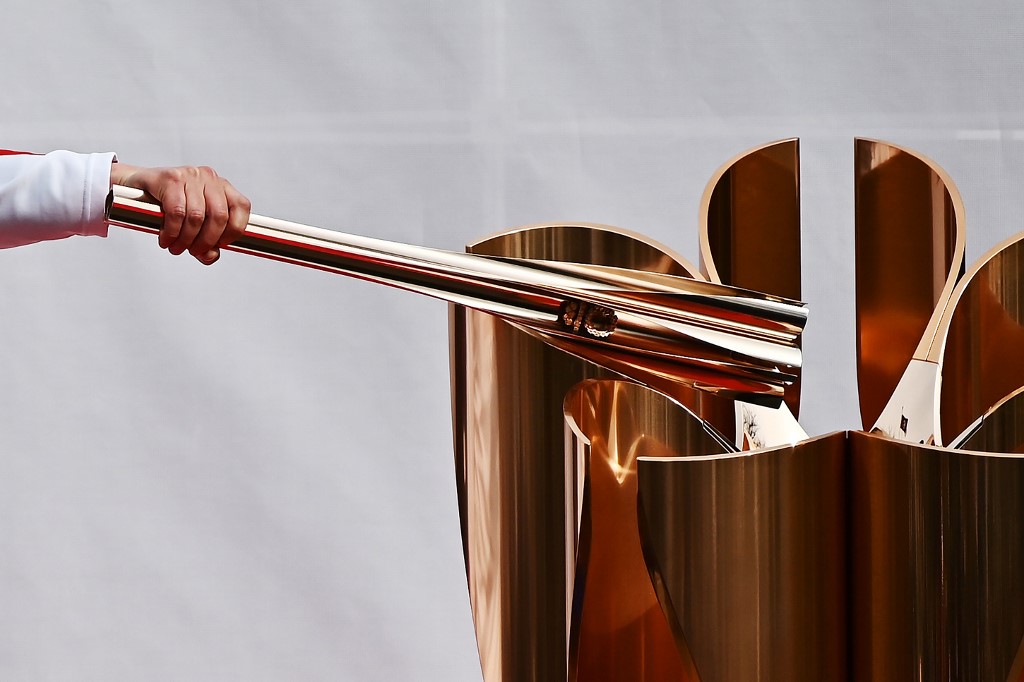
A runner holding an Olympic torch practices lighting a cauldron during a rehearsal of the Tokyo 2020 Olympics torch relay in Tokyo on February 15, 2020. (Photo by CHARLY TRIBALLEAU / AFP)
Proudly sporting the red belt marking him out as one of the 15 highest-ranked Japanese judo masters in history, 97-year-old Ichiro Abe hopes the sport’s homecoming at the Tokyo 2020 Olympics will be more than a quest for gold.
Just three years shy of his 100th birthday and with the clock ticking towards the Games, Abe is training with a younger disciple during the famous Winter Training at the Tokyo Kodokan, where the sport began nearly 140 years ago.
Despite Japanese fans and media pinning their hopes on a rich haul of judo medals, Abe said the Olympics are a chance to show the world the real significance of the home-grown sport, which prizes discipline over competition.
“All in all, we should not forget the original spirit of judo,” Abe told AFP as he limbered up in the Kodokan’s seventh-floor dojo for the session that starts at 5:30 am sharp and attracts pilgrims from around the world.
Abe points to the teachings of judo founder Jigoro Kano, who stares down benevolently from a black-and-white portrait at the front of the dojo.
“Now winning medals comes ahead of everything. I hope that will be reviewed a bit,” said Abe, who describes Kano as a “god”.
Judo is likely to be one of the hottest tickets in Tokyo as it returns to the country where Kano established it in 1882, combining different forms of jujitsu with his own ideas, including spiritual discipline.
Kano believed judo’s ultimate goal was to “strive for personal perfection” through discipline and training, in turn contributing to society.
The sport’s founder is inextricably linked to the Olympics. He was the first Asian member of the International Olympic Committee in 1909 and travelled abroad to demonstrate judo, helping it to feature when Tokyo last hosted the Games in 1964.
He is a legend in Japan who promoted sport far beyond judo. He established the nation’s first physical education course at a Tokyo University, and founded the forerunner to the Japan Sports Association.
– ‘Best and strongest’ – AFP was given rare access to the hallowed Kodokan dojo for Winter Training, attended by judoka ranging in age from Abe down to pre-school children.
Everyone sits barefoot and bows to Kano’s portrait before undergoing a rigorous warm-up routine led traditionally by one of the youngest participants — in this case a boy around 12 years old.
It is an emotional experience for many of the first-time foreigners, some of whom have travelled large distances at great expense to fulfil their dream of taking part in Winter Training at the Kodokan.
As he marshalled the participants in the traditional roll-call, training supervisor Motonari Sameshima also stressed the spirit of the sport over the competitive aspect.
“Whether you win or lose, it’s just another form of training,” said Sameshima.
Participants were taking the message to heart. Fabiana Morita, a 23-year-old Japanese-Brazilian, said she could not imagine her life without judo.
“Without judo, I would not know what to do in Japan,” she said, adding that the discipline of the sport had helped her “grow personally”.
But despite the emphasis on the spirit of judo, there are high hopes Japanese judoka will make a sizeable contribution to the home nation’s target of 30 golds, set by judo great and IOC member Yasuhiro Yamashita.
“It can be achieved for sure” with home advantage, said Yamashita, noting Japan’s best-ever Rugby World Cup performance last year when the country hosted the event.
Yamashita, who won gold at the 1984 Los Angeles Olympics, is the second judoka with IOC membership after Kano himself.
At the last Olympics in Rio, Japanese judoka took home a record 12 medals in all classes, including three golds.
Men’s team coach Kosei Inoue, who himself won gold in Sydney, said: “It’s the year to make a large flower bloom. We have to aim to be the best and the strongest.”
Wataru Naito, a 20-year-old university student taking part in the Winter Training, said he wanted his compatriots to showcase their talents on the biggest stage.
“I want them to show what Japanese judo is.”

